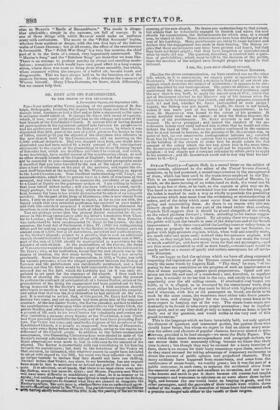STEAM-VESSRLS.—Captain Hall, in a second letter on the subject of
steam-vessels, addressed to the editor of the United Service Journal, mentions, as he had promised, a second improvement in the management of them, which has been used in the steam-boats employed in the Tay. This is an ingenious invention of Messrs. Carmichael of Dundee, by which, on the mere turning of an index-hand on deck, the vessel can he 'made to go fast or slow, or to back, as the captain or pilot may see fit. The hand is no more than a horizontal iron bar about two feet long, and the index is marked in such a way as wholly to preclude the possibility of the errors which may occur from the mishearing or misinterpreting of orders, and of the delay which must occur from the time consumed in giving and. transmitting them. As there is no reason why this ma- chinery should be fixed on one part of the vessel rather than another, Captain Hall suggests that it should be placed alongside of the wheel, on the raised platform forward ; Where, according to his former sugges- tion, the wheel ought to be placed. By adopting these two suggestions, the public will have the benefit at once of the American and of tile Scotch improvement. If to these were added the landing-boats or safety-boats as they may as properly be called, recommended in our last Number, to- gether with high-pressure engines, which, when well and soundly made, are much safer and more easily worked than low-pressure erigines, and which, as they weigh less, and occupy less space, do not strain the vessel so much a-midships, and leave more room for fuel and passengers,—and are thus more economical as well as more handy,—steam-boats would be nearly perfect as a means of speedy and certain conveyance for all mode- rate distances.
We are happy to find the opinions which we have all along expressed respecting thd regulations of the Thames steam-boats -corroborated in nearly the same words by Captain Hall. "The idea," he says, "of im- posing by law any restriction on the progress of such an improvement as that of steam navigation appears quite preposterous. Speed and cer- tainty are the life and :sou). of a steam-boat ; and, therefore, to regulate her pace, is actually to tie her feet in the race, and totally to destroy her superiority over the old sailing vessels. If overloaded coal barges arc liable, as it is alleged, to be swamped by the steam-boats' wave, they must either be less loaded, or they must be fitted with higher gunwales; and if wherries, with five or six *passengers on board, are liable to be sunk by the same cause, the waterman must either take fewer passen- gers at once, and charge higher for the risk, or they must learn to be more expert in keeping out of the way. The steam-boats ought un- doubtedly to be forced to take every propeisprecaution ; but to regulate their speed, and to say they shall go only so many knots an hour, is maul. festly out of the question, and would strike at the very root of this grand invention."
This is the language which we have invariably held, not only against the clamour of ignorant and interested psrties, bet against those who should know better, but Whom we regret to find on almost every occa- sion the eiders and abettors of popular clamour, however absurd or miss ehievous, provided it be loud enough—we mean the Daily Papers. The facts which they insert from correspondents and paragraph-makers, we can excuse them from accurately sifting, because we know that their time is short ; but though they may be excused for a hasty insertion of facts, there is no excuse for their hasty reasonings uponthem, much less do they stand excused for taking advantage of temporary excitement to direct the current of public opinion into prejudiced channels. That many accidents have happened from steam-boats, and some from the carelessness of steam-boats, we readily grant; but it was the part of a public instructor, in such cases, to separate the accidental abuse from 4heessential..use,if so:great-and-excellent an inv.ention, and not to in- voke, heaven and ,earth to-put it down because- old custom. had :taught bargemasters•and waterinen.to calculate-0'1.n° wave above :three inches nut! because the one-would Waist on leapingin goods, 'and the- .other,pasSengers, zuntil-thegunwalesof their vessels were within three- • iuthes Arthe Water, After-the invention of eteain-boats. had rendered such: -a-prat drew:lona-life tftherto-the• reek% or their cargoes.


























 Previous page
Previous page